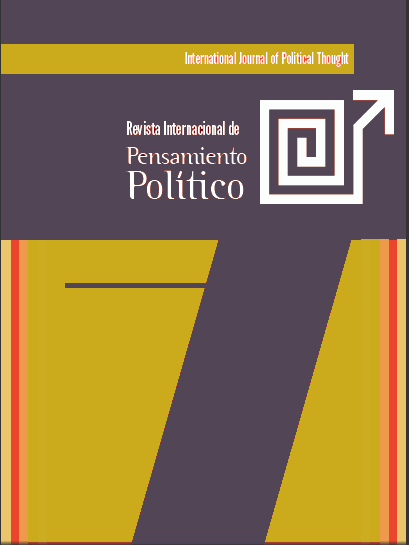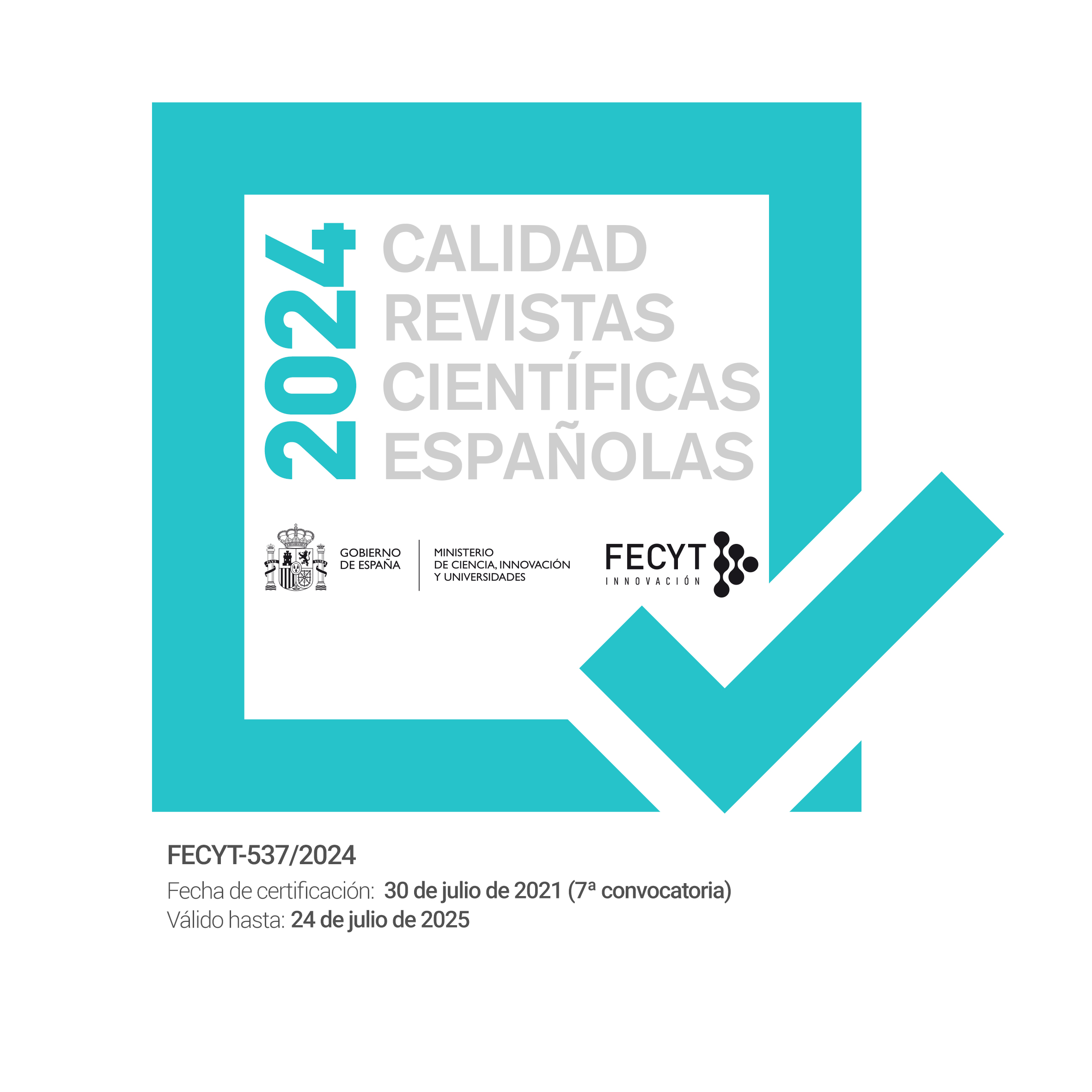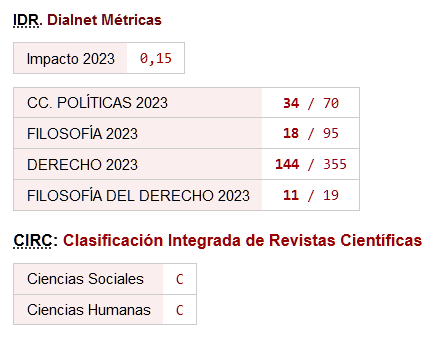A fictional speculation on the concept of being human in the technological age
Brain wave by Poul Anderson
DOI:
https://doi.org/10.46661/revintpensampolit.10868Keywords:
Science fiction and law, rational intelligence, emotions and relational autonomy, animal rightsAbstract
Science fiction is a prolific genre with critical-constructive potential regarding the notion and position of humanity in relation to other living beings. the ability to create speculative stories about probable futures in which technology has advanced allows for the exploration of ethical, moral, and legal issues that are highly relevant today. beyond the novels commonly associated with the transhumanist movement, those that reconstruct the humanist concept of the subject without completely detaching from it are particularly interesting. Among these, and setting aside the most frequently analyzed and studied works, Poul Anderson’s brain wave emerges as a significant fiction for questioning the defining and privileged characteristics of humanity in relation to other living beings, prompting essential reflection on rights. two significant themes can be highlighted in this work: the first is the overvaluation of rational intelligence and the illusory moral self-sufficiency of humans, and consequently, the defense of the crucial role of emotions and the necessary relational moral autonomy that defines human beings. the second theme concerns the questioning of humanity’s privileged position in the world, as we are, in fact, fragile and vulnerable beings, sentient entities that suffer like other animals. It is precisely this vulnerability that fosters bonds of empathy and compassion with other sentient beings, which can help reframe the notion of social justice and our way of life in communion with nature.
Downloads
References
Adams, Carol J. (2016). “The war on Compassion”. En The Carol J. Ademas Reader. Writings and Conversations 1995-2015 (pp. 3-22). Bloomsbury.
Anderson, Poul (2018), Brave Wave (1954). Open Road.
Azpitarte, Virtudes (2023). Animales: sujetos emergentes en derecho y política. Tirant lo Blanch.
Barceló, Miquel (2015). La ciencia ficción. UOC.
Butler, Judith (2007). El género en disputa. El feminismo y la subversión de la identidad. Trad. M. A. Muñoz Molina. Paidós.
De Andrés, Victoria, López Martin, Alejandro, Olivero, Jesús, Paul Palmqvist (2020). “La ciencia y el animalismo”. Encuentros en la biología, vol. XIII, núm. 171, pp. 19-33.
De Lucas Martín, Javier (2003). El Derecho, guardián de las diferencias. Tirant lo Blanch.
(2023). “Prólogo”. En Azpitarte, Virtudes. Animales: sujetos emergentes en derecho y política” (pp. 9-15). Tirant lo Blanch.
Derrida, Jacques (2008). El animal que luego estoy si(gui)endo. Trad. C. de Peretti y C. Rodríguez Marciel. Trotta.
Descartes (2011). Meditaciones metafísicas (1641). Trad. G. Graiño Ferrer. Alianza Editorial.
Diéguez, Antonio (2017). Transhumanismo. La búsqueda tecnológica del mejoramiento humano. Herder.
Donaldson, Sue, Kymlicka, Will (2011). Zoopolis. A Political Theory of Animal Rights. Oxford University Press.
Einsenstein, Sergei (1974). El sentido del cine. Trad. I. Carballo. Siglo XXI.
- (1970). Reflexiones de un cineasta. Prol., ed., y notas de R. Gubern. Lumen.
Fineman, Martha A. (2011). “The Vulnerable Subject and The Response of The State”. Emory Law Journal, vol. 60, n. 2, pp. 251-275.
García Figueroa, Alfonso (2019). “Las virtudes de la ciencia ficción”. Cuadernos electrónicos de Filosofía del Derecho, núm. 40, pp. 265-291. https://doi.org/10.7203/CEFD.40.13885 DOI: https://doi.org/10.7203/CEFD.40.13885
García López, Daniel (2016). Rara Avis. Una teoría queer impolítica. Melusina.
Gilson, Erinn (2013). The Ethics of Vulnerability: A Feminist Analysis of Social Life an Practice. Routledge.
Grear, Anna (2010). Redirecting Human Rights: Facing the challenge of Corporate Legal Humanity. Palgrave Macmillan. https://doi.org/10.1057/9780230274631 DOI: https://doi.org/10.1057/9780230274631
Heller, Agnes (1994, 2ª ed.). El hombre del Renacimiento. Trad. J. F. Yvars y A. Prometeo, Ediciones Península.
Holliger, Verónica (2009). Posthumanism and Cyborg Theory. Routlege.
Honneth, Axel (1997). La lucha por el reconocimiento. Trad. M. Ballestero. Crítica.
Honneth, Axel (2007). Reification: A New Look at an Old Idea. Oxford University Press. https://doi.org/10.1093/acprof:oso/9780195320466.001.0001 DOI: https://doi.org/10.1093/acprof:oso/9780195320466.001.0001
Kennedy, Ducan (1979). “The Structure of Blackstone´s Commentaries”. Buffalo Law Review, n. 28, pp. 209-382.
Keynes, Daniel (2021). Flores para Algernon (1959, 1966). Trad. D. Santos. Alamut.
Korsgaard, Christine M. (2018). Fellow Creatures. Our Obligations to the Other Animals, Oxford University Press. https://doi.org/10.1093/oso/9780198753858.001.0001 DOI: https://doi.org/10.1093/oso/9780198753858.001.0001
Kracauer Siegfried (1996, 2ª ed.). Teoría del cine. La redención de la realidad física. Trad. J. Hornero, Paidós.
Krueger, Oliver (2005). “Gnosis and Cyberspace? Body, Mind and Progress in Posthumanism”. Journal of Evolution and Technology, vol. 14, núm. 2, pp. 77-89.
Lalatta Costerbosa, Marina (2024). “Derechos de los animales. Un desafío para el Derecho , la moral y la política”. Derechos y Libertades, núm. 50, pp. 75-83. https://doi.org/10.20318/dyl.2024.8232 DOI: https://doi.org/10.20318/dyl.2024.8232
Llinás Begon, Joan Lluís (2024). “Sustancia, sujeto y ser humano: un conflicto cartesiano”. Anuario filosófico, núm. 57/1, pp. 95-113. https://doi.org/10.15581/009.57.1.004 DOI: https://doi.org/10.15581/009.57.1.004
Llorens Serrano, Jaume (2016). La transcendencia del homo sapiens. El icono del posthumano en la ciencia ficción. Tesis doctoral. Universidad Autónoma de Barcelona.
López Nieto, Marcos (2020). Fundamentos para un derecho a la inteligencia artificial: ¿queremos seguir siendo humanos? Tirant lo Blanch.
Merleau- Ponty, Maurice (2010). Lo visible y lo invisible (1964). Trad. E. Cosigli y B. Capdevielle. Ed. Nueva visión.
Milburn, Colin (2014). “Posthumanism”. En Lantham, Rob, The Oxford Handbook of Science Fiction. Oxford University Press.
Moreno, Fernando Ángel (2010). Teoría de la literatura de ciencia ficción. Poética y retórica de los prospectivo, Portal Ediciones.
Nussbaum, Martha C. (1995). La fragilidad del bien. Fortuna y ética en la tragedia y filosofía griega. Trad. A. Ballesteros. La Balsa de Medusa.
Nussbaum, Martha C. (2023). Justice for Animals. Our Colective Responsibility. Simon & Schuster.
Peces Barba Martínez, Gregorio (1998). “Tránsito a la Modernidad y derechos fundamentales” (pp. 13-264). En Peces Barba Martínez, Gregorio y Fernández García, Eusebio (dirs.), Historia de los derechos fundamentales, t. I. Tránsito a la Modernidad. Siglos XVI y XVII. Instituto de derechos humanos Bartolomé de las Casas, Universidad Carlos III de Madrid, Dykinson.
Peces Barba Martínez, Gregorio (2003). La dignidad humana de la persona desde la Filosofía del Derecho, Dykinson.
Pelé, Antonio (2012). El discurso de la dignita hominis en el humanismo del Renacimiento. Cuadernos del Instituto Bartolomé de las Casas, Dykinson.
Prieto López, Leopoldo José (2017). En torno al animal racional. Ensayos de antropología biológica. Universidad Francisco de Vitoria.
Regan, Tom (1986). “A case for animal rights (1983)” (pp. 179-189). En Fox, Michael W. & Mickley, Linda D. (Eds.), Advances in animal welfare science 1986/87. The Humane Society of the United State. https://doi.org/10.1007/978-94-009-3331-6_15 DOI: https://doi.org/10.1007/978-94-009-3331-6_15
Sánchez Rubio, Daniel (2010). “La ciencia ficción y derechos humanos. Una aproximación desde la complejidad, las tramas sociales y las condicionales contrafácticos”. Revista Praxis, núm. 65-64, pp. 51-72.
Sheler, Max (2017). El puesto del hombre en el cosmos (1928). Trad. e introd. M. Oliva. Escolar y Mayo.
Singer, Peter y Cavaliere, Paola (eds.) (1998). El proyecto de gran simio: la igualdad más allá de la humanidad. Trad. C. Martín. Trotta.
Stalsett, Sturla J. (2005). “Vulnerabilidad, dignidad y justicia: valores éticos fundamentales en un mundo globalizado” (pp. 45-46). En Kliksberg, Bernardo (ed.), La agenda ética pendiente de América Latina. Fondo de Cultura Económica de Argentina.
West, Robin (2000). Género y Teoría del Derecho. Trad. e introd. I. C. Jaramillo. Siglo del hombre.
Wittig, Moniq (2010). El pensamiento heterosexual. Trad. J. Saéz y P. Vidarte. Egales.
Downloads
Published
How to Cite
Issue
Section
License
Copyright (c) 2024 Cristina Monereo Atienza

This work is licensed under a Creative Commons Attribution-NonCommercial-ShareAlike 4.0 International License.
Open access policy
Free and open access is allowed to any interested party to all the contents of the journal issues, free of charge, being able to print and transfer all the articles, with the only condition of specifying the source and authorship.
The journal: a) does not charge authorship costs for the processing of articles or for their submission, b) maintains copyright for authors without restrictions, c) facilitates authors to keep their publication rights without limitations.
The International Journal of Political Thought is an original work of the Laboratory of Political Ideas and Practices of the Pablo de Olavide University. All articles included in the Journal are original work of their respective authors. This Journal is freely offered to the scientific and academic community at no cost and releases the contents according to the license "Attribution-NonCommercial-ShareAlike 4.0 CC BY-NC-SA" of the Creative Commons project available in the following url: https://creativecommons.org/licenses/by-nc-sa/4.0/legalcode
If you wish to translate or compile any of the articles available here, please contact us at contacto













 ISSN: 1885-589X
ISSN: 1885-589X  Universidad Pablo de Olavide
Universidad Pablo de Olavide